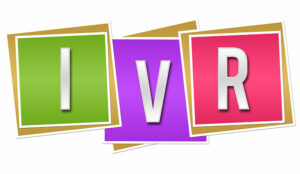Dealing with billing issues can be a major call centre customer service hurdle, even for the most experienced agents. Studies show that in banking or finance, the number one reason for calls to support lines is billing related. But there is a way to streamline bill paying without compromising service.
Using automated systems, like Interactive Voice Response (IVR), can greatly reduce these stressors and improve the customer experience.
In fact, 80% of contact centres find automated and AI-based tools incredibly important in their day-to-day operations. An IVR payments system is a fantastic solution for busy customers who want to pay their bills and go on with their days.
This blog will look at what IVR is, its benefits, and how using an IVR payment system can improve your business outcomes.
What Is IVR?
Interactive Voice Response (IVR) refers to an automated phone system. It acts like a menu that a caller can choose from to route them to the correct department.
An IVR system directs incoming callers to access information without needing to speak to a person. This has two benefits: it helps customers find a solution quickly while streamlining the productivity and time of call centre agents.
With IVR, callers use the touch-tone keypad or speak into the phone to self-direct the call. Some examples of an IVR automated menu include:
- Press 1 for sales
- Press 2 for credit information
- Press 3 for Spanish
- Press 4 for account services
- Press 5 to speak with a customer service representative
IVR is a call centre technology advancement that streamlines call routing right from the start. Improving call routing is a good way to keep customer satisfaction rates high. Plus, 75% of customers feel they should have the ability to solve their own problems.
Allowing customers to choose from an automated menu makes them feel involved in the process and personalizes the customer experience right from the start. This seemingly simple technological tool has remarkable results:
- IVR minimizes call wait times.
- IVR minimizes queuing.
- IVR saves resources and time, allowing agents to respond to customers quickly and empathetically.
- IVR decreases call transfers.
- IVR boosts call resolution.
How Do IVR Payments Work?
IVR isn’t only useful for directing customer calls. IVR is also a resource when payments are involved, particularly for companies that process a high volume of orders regularly, or that encounter disputes.
IVR payments work by integrating with an existing IVR or contact centre software or are part of an Interactive Voice Response Platform.
- IVR payments can be used for a range of payment needs. Use cases for IVR payments include banks and debt collection, utility payments, storage facilities, subscriptions, and donations.
- IVR payments are often self-service but can also be agent-assisted. Self-service IVR payments are based on speech recognition and AI. Both work together to process and decipher a customer request against a predetermined, keyword-specific script. Agent-assisted IVR is when the agent is part of the call throughout a payment but can be blocked from hearing credit card details.
But this isn’t all an IVR system offers call centres and other businesses. More IVR payments features include:
- SMS payment confirmations
- Templated scripts and editing tools
- Omnichannel payment methods
- Call routing options
- Account information and credit card details
The Benefits of IVR Payments Systems
Because an IVR payments system allows customers to make payments right away, it provides customers with peace of mind, knowing that their payments will not be late or missed. Other benefits of an IVR payments system include:
A Reduction in Late Customer Payments.
Up to 46% of customers make late payments on some bills. But IVR payments systems make it easier for customers to remember to pay their bills. Plus, with an automated, 24/7 system, they can make payments at any time.
IVR also allows customers to sign up for automatic payments, further reducing the chances of late payments.
Quickly Resolves Billing Disputes.
Because IVR payments record payment information and transaction history, it is an invaluable tool during billing disputes. Agents can pull all the information with the click of a mouse, speeding up resolution.
It Frees Up Agents.
When customers can pay bills themselves, it frees agents to focus on other issues that might crop up. Automating payments means agents are available to take other calls and customer inquiries right away, all of which help provide an excellent customer experience.
Higher Levels of Security.
IVR payments are secure. They are PCI and NACHA compliant, meaning they use data encryption and restricted access to cardholder information. Agents don’t manually handle data, so there is no danger of incorrect information.
It is advised that you make sure your IVR payments system has PCI Level 1 compliance to guard against cyberattacks or breaches. IVR also requires authorization and authentication information from callers, which is then verified with the existing information in the database.
Decreased Operating Costs.
IVR payments reduce the instance of manually collecting information. Agents do not have to work through lunches or work longer shifts to take calls.
An IVR payment system is available 24-hours a day, seven days a week. Considering 30% of customers prefer to make payments after normal business hours, this is a huge benefit.
Improves Customer Experience (CX).
Improving the customer experience (CX) is a top priority for call centres. An automated IVR system is a great way to do this. Customers can achieve their goals quickly and easily, without long hold times or drawn-out resolutions.
The Future of IVR Payments
IVR payments will not replace agents, but it is a useful tool for call centres. For simple tasks or information requests, IVR is a direct way to save your business and a customer’s time.
IVR payments is a great example of how technological advancements can help make life easier for agents and customers alike.
Quality assurance software is another example. From agent self-evaluation to performance metrics, to scorecards, a QA program can elevate your call centre team like never before.
This blog post has been re-published by kind permission of Scorebuddy – View the Original Article
For more information about Scorebuddy - visit the Scorebuddy Website
Call Centre Helper is not responsible for the content of these guest blog posts. The opinions expressed in this article are those of the author, and do not necessarily reflect those of Call Centre Helper.
Author: Scorebuddy
Published On: 9th Jun 2022 - Last modified: 15th Jun 2022
Read more about - Guest Blogs, Scorebuddy






 Scorebuddy is quality assurance solution for scoring customer service calls, emails and web chat. It is a dedicated, stand-alone staff scoring system based in the cloud, requiring no integration.
Scorebuddy is quality assurance solution for scoring customer service calls, emails and web chat. It is a dedicated, stand-alone staff scoring system based in the cloud, requiring no integration. 









